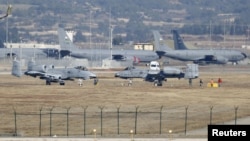A top Turkish official said last week that Ankara may consider closing the Incirlik Air Base, which the U.S. uses as the major hub for U.S.-led coalition airstrikes.
Turkish President Tayyip Erdogan’s chief adviser Seref Malkoc told Bugun newspaper that Turkey could act if the U.S. does not change its stance against the Kurds.
But such a move would only escalate what has already become a major diplomatic crisis, analysts say. It also could cripple Western and Turkish efforts against Islamic State (IS) as the U.S. military operation would struggle to find a place elsewhere in the region, they say.
Robert Pearson, a former U.S. Ambassador to Ankara, told VOA that the consequences of banishing the U.S. from Incirlik would be serious.
“It would produce a major crisis. There would be degrees of reactions by Washington depending on restrictions that Turkey might impose on the use of the base."
“Closing Incirlik would bring Turkish-American relations to a new low,” Pearson added. “Americans would interpret such a move as an attempt to bully the U.S., and the reaction in the U.S. Congress would be very negative.”
Importance of Incirlik
The U.S.-led coalition has conducted hundreds of missions against IS from Incirlik since Ankara gave the green light for its use in September last year. The number of American military forces in Incirlik has grown to 2,500 from 1,300 before the operation began.
"This is a very important location on the tip of the spear," Defense Secretary Ash Carter told U.S. troops when he visited Incirlik in December.
Turkey and the U.S. have tightened cooperation in recent months in the fight against IS. The U.S. has helped Turkey to seal its borders.
A Pentagon spokeswoman told VOA that Ankara has not conveyed any plans to change operations at Incirlik.
“We haven't heard this from the Turkish government. U.S. and coalition aircraft continue operations out of Incirlik. This access increases our operational reach and flexibility to target IS,” she said.
If the Turks follow through on closing Incirlik, it would be detrimental to the coalition efforts against IS, former diplomat Pearson said.
“In terms of bringing peace in Syria, restricting the use of Incirlik would neither be in the U.S. nor Turkish interest,” Pearson said.
Alternatives
Cengiz Aktar, a political scientist from Bahcesehir University in Istanbul, told VOA that the U.S., if forced, could eventually find a new base to strike IS.
“The U.S. military would relocate to Iraqi Kurdistan, [the United Arab] Emirates or in the future, when the time comes, even to Syria,” he said.
Kurdish forces in Syria have recently extended a runway at an airstrip in an agricultural area that would be large enough for coalition planes to land. The plans for the airstrip are for humanitarian aid and military supplies for U.S-backed Kurdish and Arab forces, Kurdish commanders told VOA recently.
'Taking a pulse'
But so far, there has been little indication Turkey will act on the Incirlik threats.
Erdogan downplayed the comments of his adviser Malkoc, saying Incirlik’s fate was for the government to decide. And there was no mention by Malkoc of asking other coalition partners flying from the base to leave.
But Ali Akel, a journalist-commentator from Turkey, said that Malkoc did not act independently.
“They were probably taking a pulse,” he said of the Erdogan administration. “They may have wanted to see what kind of reactions they would get to an extremely strong statement like that.”
Akel said he doubted that Ankara’s threat to close the base would change U.S. policy toward the Kurds.
“I believe that, as far as Washington is concerned, the Incirlik base is not a bargaining chip,” he said.
Soner Cagaptay, a Turkey expert at the Washington Institute, said closing Incirlik would only bring the U.S closer to the Kurds – the opposite of what Turkey wants.
The U.S. would look for other allies, including PYD and Iraqi Kurdish Regional Government (KRG), who can step in and take Turkey’s place, he said.
The “rupture in U.S-Turkish relations,” Cagaptay said, would only leave Turkey more vulnerable politically and militarily.




